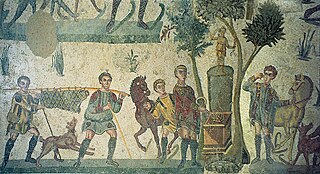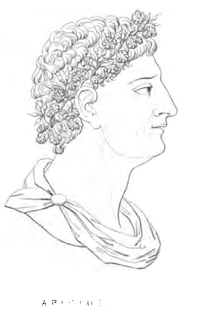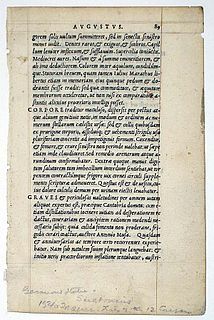Bibliography
- Dalby, Andrew (2003), Food in the Ancient World from A to Z, London, New York: Routledge, ISBN 0-415-23259-7 CS1 maint: discouraged parameter (link) p. 16
Apicius is the name of a Roman lover of luxury who lived in the 90s BC and was said to have outdone all his contemporaries in lavish expenditure. [1] [2] According to Poseidonius, Apicius was responsible for the banishment from Rome of Rutilius Rufus, who was the author of a history of Rome written in Greek and was notable for the modesty of his entertaining.
As Tertullian observes, this early Apicius gave his name to a series of later gourmets and cooks, notably Marcus Gavius Apicius and a slightly later Apicius who lived in the 2nd century AD. Apicius was not transmitted as a family name, but was apparently applied as a nickname, meaning "gourmand". For the same reason, the name of Apicius was eventually thought appropriate for a cookbook, and as such was applied both to the late Roman cookery text currently known as Apicius and to the quite different and much briefer Excerpta Apicii ("Abridged Apicius") ascribed to Vinidarius.

A gladiator was an armed combatant who entertained audiences in the Roman Republic and Roman Empire in violent confrontations with other gladiators, wild animals, and condemned criminals. Some gladiators were volunteers who risked their lives and their legal and social standing by appearing in the arena. Most were despised as slaves, schooled under harsh conditions, socially marginalized, and segregated even in death.
Pope Linus was the second bishop of Rome. His pontificate endured from c. AD 67 to his death. Among those to have been pope, Peter, Linus, and Clement I are specifically named in the New Testament. Linus is named in the valediction of the Second Epistle to Timothy as being with Paul the Apostle in Rome near the end of Paul's life.

Tertullian was a prolific early Christian author from Carthage in the Roman province of Africa. Of Berber origin, he was the first Christian author to produce an extensive corpus of Latin Christian literature. He was an early Christian apologist and a polemicist against heresy, including contemporary Christian Gnosticism. Tertullian has been called "the father of Latin Christianity" and "the founder of Western theology."
Pope Soter was the twelfth bishop of Rome from c. 167 to his death in c. 174. According to the Annuario Pontificio, the dates may have ranged from 162–168 to 170–177. He was born in Fondi, Campania, today Lazio region, Italy. Soter is known for declaring that marriage was valid only as a sacrament blessed by a priest and also for formally inaugurating Easter as an annual festival in Rome. His name, from Greek Σωτήριος from σωτήρ "saviour", would be his baptismal name, as his lifetime predates the tradition of adopting papal names.

The pontifex maximus was the chief high priest of the College of Pontiffs in ancient Rome. This was the most important position in the ancient Roman religion, open only to patricians until 254 BC, when a plebeian first occupied this post. Although in fact the most powerful office in the Roman priesthood, the pontifex maximus was officially ranked fifth in the ranking of the highest Roman priests, behind the rex sacrorum and the flamines maiores.

Gordian III was Roman emperor from AD 238 to 244. At the age of 13, he became the youngest sole Roman emperor. Gordian was the son of Antonia Gordiana and Junius Balbus who died before 238. Antonia Gordiana was the daughter of Emperor Gordian I and younger sister of Emperor Gordian II. Very little is known of his early life before his acclamation. Gordian had assumed the name of his maternal grandfather in 238 AD.

The cuisine of ancient Rome changed greatly over the duration of the civilization's existence. Dietary habits were affected by the political changes from kingdom to republic to empire, and the empire's enormous expansion, which exposed Romans to many new provincial culinary habits and cooking methods.

Marcionism was an early Christian dualistic belief system that originated from the teachings of Marcion of Sinope in Rome around the year 144. Marcion was an early Christian theologian, evangelist, and an important figure in early Christianity. He was the son of a bishop of Sinope in Pontus. About the middle of the 2nd century (140–155) he traveled to Rome, where he joined the Syrian Gnostic Cerdo.
An apostolic see is an episcopal see whose foundation is attributed to one or more of the apostles of Jesus or to one of their close associates. In Catholicism the phrase, preceded by the definite article and usually capitalized, refers to the See of Rome.
The Robigalia was a festival in ancient Roman religion held April 25, named for the god Robigus. Its main ritual was a dog sacrifice to protect grain fields from disease. Games (ludi) in the form of "major and minor" races were held. The Robigalia was one of several agricultural festivals in April to celebrate and vitalize the growing season, but the darker sacrificial elements of these occasions are also fraught with anxiety about crop failure and the dependence on divine favor to avert it.

Apicius, also known as De re culinaria or De re coquinaria is a collection of Roman cookery recipes. It is thought to have been compiled in the 1st century AD in a language in many ways closer to Vulgar than to Classical Latin. Later recipes using Vulgar Latin were added to earlier recipes using Classical Latin.
Romanitas is the collection of political and cultural concepts and practices by which the Romans defined themselves. It is a Latin word, first coined in the third century AD, meaning "Roman-ness" and has been used by modern historians as shorthand to refer to Roman identity and self-image.

Apologeticus is a text attributed to Tertullian, consisting of apologetic and polemic. In this work Tertullian defends Christianity, demanding legal toleration and that Christians be treated as all other sects of the Roman Empire. It is in this treatise that one finds the sentence "Plures efficimur, quitiens metimur a vobis: semen est sanguis Christianorum." which has been liberally and apocryphally translated as "the blood of the martyrs is the seed of the Church". Alexander Souter translated this phrase as "We spring up in greater numbers the more we are mown down by you: the blood of the Christians is the seed of a new life," but even this takes liberties with the original text. "We multiply when you reap us. The blood of Christians is seed," is perhaps a more faithful, if less poetic, rendering.
Apelles was a second-century Gnostic Christian thinker. He started out his ministry as a disciple of Marcion of Sinope, probably in Rome. But at some point, Apelles either left, or was expelled from, the Marcionite church.

Marcus Gavius Apicius is believed to have been a Roman gourmet and lover of luxury, who lived sometime in the 1st century AD, during the reign of Tiberius. The Roman cookbook Apicius is often attributed to him, though it is impossible to prove the connection. He was the subject of On the Luxury of Apicius, a famous work, now lost, by the Greek grammarian Apion. M. Gavius Apicius apparently owed his cognomen to an earlier Apicius, who lived around 90 BC, whose family name it may have been: if this is true, Apicius had come to mean "gourmand" as a result of the fame of this earlier lover of luxury.

The persecution of Christians in the Roman Empire occurred throughout most of the Roman Empire's history, beginning in the 1st century AD. Originally a polytheistic empire in the traditions of Roman paganism and the Hellenistic religion, as Christianity spread through the empire, it came into ideological conflict with the Imperial cult of ancient Rome. Pagan practices such as making sacrifices to the deified emperors or other gods were abhorrent to Christians as their beliefs prohibited idolatry. The state and other members of civic society punished Christians for treason, various rumored crimes, illegal assembly, and for introducing an alien cult that led to Roman apostasy.

Sol is the personification of the Sun and a god in ancient Roman religion. It was long thought that Rome actually had two different, consecutive sun gods: The first, Sol Indigos, was thought to have been unimportant, disappearing altogether at an early period. Only in the late Roman Empire, scholars argued, did solar cult re-appear with the arrival in Rome of the Syrian Sol Invictus, perhaps under the influence of the Mithraic mysteries. Recent publications have challenged the notion of two different sun gods in Rome, pointing to the abundant evidence for the continuity of the cult of Sol, and the lack of any clear differentiation – either in name or depiction – between the "early" and "late" Roman sun god.

The Roman historian Suetonius mentions early Christians and may refer to Jesus Christ in his work Lives of the Twelve Caesars. One passage in the biography of the Emperor Claudius Divus Claudius 25, refers to agitations in the Roman Jewish community and the expulsion of Jews from Rome by Claudius during his reign, which may be the expulsion mentioned in the Acts of the Apostles (18:2). In this context "Chresto" is mentioned. Some scholars see this as a likely reference to Jesus, while others see it as referring to an otherwise unknown person living in Rome.
Apollophanes of Antioch was a Stoic philosopher. During his life, he left the Seleucid empire for Athens. There he became a pupil and friend of Aristo of Chios. As a student of Aristo, he may have call himself an Aristonian. There is some assertion that he is the same as Apollophanes the physician who lived at the court of Antiochus.